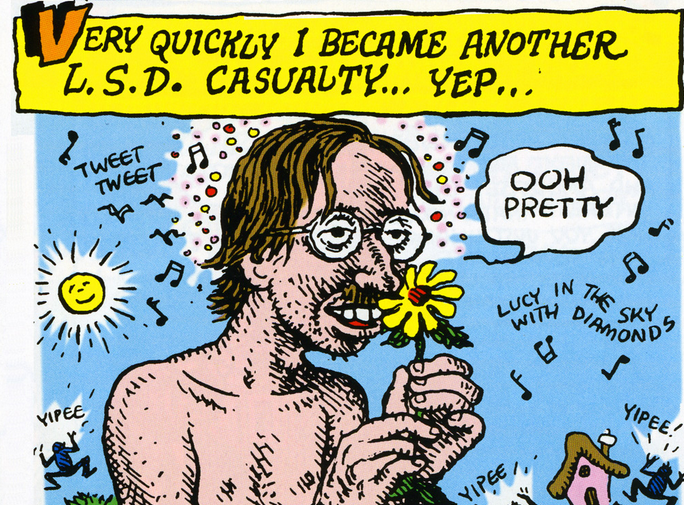As Nancy Reagan and my junior high school health teacher will tell you, LSD is illegal and illegal drugs are bad.
Unlike other drugs, however, LSD can blow open — as Aldous Huxley described it — the doors of perception and remove the filters of conventional thought. It has pushed some of the 20th century’s most creative minds into making important cognitive leaps. Nobel Prize-winning scientist Francis Crick famously first imagined DNA’s double-helix structure after dropping acid. Steve Jobs described his first trip as one of the most profound experiences in his life. And in June 20, 1970, Pirates pitcher Dock Ellis threw a no-hitter (or so the legend goes) while tripping on a preposterously large dose of the stuff. Let’s see you do that on meth.
Add to this list of acid acolytes Robert Crumb, the most influential cartoonist of his generation. His strange, frequently obscene, often hilarious stream-of-consciousness cartoons defined a certain subset of hippydom as much as the Grateful Dead and Ken Kesey. And his style emerged almost immediately after his first trip.
It all started in 1964, when the drug was still legal. Crumb was stuck in a dead end job drawing greeting cards in Cleveland. “I took this very weird drug. Supposedly it was LSD, but it had a really weird effect where it made my brain all fuzzy,” he said while hunched over a drawing pad in Terry Twigoff’s 1994 documentary Crumb. (You can watch the full clip above. ) “And this effect lasted for a couple months.”
The effect of that first encounter proved to be hugely influential, a “road-to-Damascus experience” as he told the Paris Review:
It knocked you off your horse, taking LSD. I remember going to work that Monday, after taking LSD on Saturday, and it just seemed like a cardboard reality. It didn’t seem real to me anymore. Seemed completely fake, only a paper-moon kind of world. My coworkers, they were like, Crumb, what’s the matter with you, what happened to you? Because I was just staring at everything like I had never seen it before. And then it changed the whole direction of my artwork. […] I got flung back into this cruder forties style, that suddenly became very powerful to me. It was a kind of grotesque interpretation of this forties thing, Popeye kind of stuff. I started drawing like that again. It was bizarre to people who had known my work before. Even [Mad Magazine Editor Harvey] Kurtzman said, What the hell are you doing? You’re regressing!
A couple of years later, Crumb ditched Cleveland (and his first wife) and headed for San Francisco, which was just starting to become the Mecca of the counterculture. Soon issues of his Zap Comix would be blowing minds. All of his most famous characters from those cartoons– from Mr. Natural to Fritz the Cat to the Snoid – were first produced in the months immediately following that first trip.
But remember, drugs are bad. And we don’t recommend them. And if you’re wondering about LSD’s downsides, tune into what Louis CK has to say.
You can see hear Crumb expound more about LSD, San Francisco and the whole Haight-Ashbury scene below.
Related Content:
Beyond Timothy Leary: 2002 Film Revisits History of LSD
Artist Draws Nine Portraits on LSD During 1950s Research Experiment
Watch The Bicycle Trip: An Animation of The World’s First LSD Trip in 1943
Beyond Timothy Leary: 2002 Film Revisits History of LSD
Jonathan Crow is a Los Angeles-based writer and filmmaker whose work has appeared in Yahoo!, The Hollywood Reporter, and other publications. You can follow him at @jonccrow. And check out his blog Veeptopus, featuring lots of pictures of badgers and even more pictures of vice presidents with octopuses on their heads. The Veeptopus store is here.



It would be great if the author did some fact checking first. Structure of DNA was elucidated by Crick and Watson more than a decade before Crick’s “experiments” with LSD.
http://www.realclearscience.com/articles/2012/06/26/lsd_magic_mushrooms_and_scientists_on_drugs_106307.html
This was a wonderful article until you mentioned Louis CK, the most fucked up comic ever.